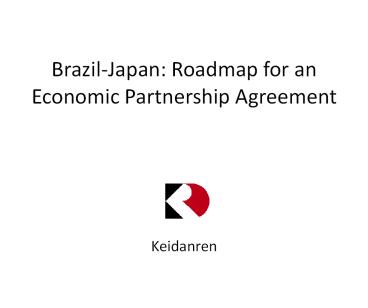Brazil-Japan: Roadmap for an Economic Partnership Agreement Keidanren - PowerPoint PPT Presentation
Title:
Brazil-Japan: Roadmap for an Economic Partnership Agreement Keidanren
Description:
Brazil-Japan: Roadmap for an Economic Partnership Agreement Keidanren RCEP (ASEAN+6) TPP 1-1 Japan-Brazil EPA is definitely needed Japan-Brazil trade relation has ... – PowerPoint PPT presentation
Number of Views:77
Avg rating:3.0/5.0
Title: Brazil-Japan: Roadmap for an Economic Partnership Agreement Keidanren
1
Brazil-Japan Roadmap for an Economic Partnership
AgreementKeidanren
2
1-1 Japan-Brazil EPA is definitely needed
TPP
RCEP (ASEAN6)
3
1-2 Japan-Brazil EPA is definitely needed
- Japan-Brazil trade relation has been expanding.
Japan's export to Brazil has grown by 99 and
import has grown by 172 in the last 15 years.
4
2-1 EPA should be comprehensive
- TPP is comprehensive covering 21 areas
21 Areas of TPP Negotiations 21 Areas of TPP Negotiations 21 Areas of TPP Negotiations 21 Areas of TPP Negotiations
1. Trade in goods (industrial goods, agriculture, textiles) 1. Trade in goods (industrial goods, agriculture, textiles) 1. Trade in goods (industrial goods, agriculture, textiles) 1. Trade in goods (industrial goods, agriculture, textiles)
2. Rules of origin 3. Trade facilitation 4. SPS 5. TBT
6. Trade remedies 7. Government Procurement 8. IPR 9. Competition
10. Services 11. Movement of natural persons 12. Financial services 13. Telecom
14. E-commerce 15. Investment 16. Environment 17. Labor issues
18. Institutional issues 19. Dispute settlement 20. Cooperation 21. Crosscutting issues
5
2-2 EPA should be comprehensive
- Future Japan-Brazil EPA should be comprehensive
as well.
1. Trade in goods
2. Rules of origin
3. Trade facilitation and customs procedure
4. Regulatory issues (SPS and TBT)
5. Trade rules
6. Investment and services
7. Intellectual property rights
8. Natural resources and energy
9. Movement of natural persons
10. Business environment
11. Government procurement
12. Dispute Settlement
6
3. Future Japan-Brazil EPA Trade in Goods
- Tariffs should be eliminated for more than 90 of
trade volume/value in 10 years after the entry
into force of the agreement. There should be no a
priori exclusion of products from the
liberalization schedule. - Japan has been keen on eliminating tariffs on
automobiles, auto parts, steel, machinery,
electronics, chemical products, construction
materials and equipment, among others. For
Brazil, agricultural products, footwear,
processed foodstuffs, wood and textiles are the
main interests. - Brazil should request consultations with Mercosur
members regarding the launch of EPA negotiations
with Japan.
7
3. Future Japan-Brazil EPA Investment and
Services
- From the view point of achieving connectivity of
supply chains, manufacturing and services should
be addressed under a unified scheme. - Foreign capital ceilings and entry barriers
should be eliminated or reduced as appropriate.
Both parties should also commit to the easing of
local contents requirements, and to the
unrestricted remittance of profits and capital,
which are key to ensuring foreign direct
investment. - Consideration should be given to the possibility
of including Investor to State Dispute
Settlement.
8
3. Future Japan-Brazil EPA Intellectual
Property Rights
- The protection of intellectual property rights is
crucial to promote investment and innovation.
Both countries shall grant non-discriminatory
protection of intellectual property complying
with the commitments established in the TRIPS
Agreement. - Restrictions on the amount and duration of
royalties should be lifted with a view to
ensuring freedom of contract. - An intellectual Property Committee should be
established under the future EPA to address these
issues.
9
3. Future Japan-Brazil EPA Natural Resources
and Energy
- Access to raw material and inputs is essential.
Export control measures and export tariffs should
be avoided in the bilateral trade. - Restrictions (such as local contents requirements
and foreign capital ceilings) should be
eliminated or reduced, as appropriate, so as to
promote joint projects and technical transfer
related to natural resources and energy
development.
10
3. Future Japan-Brazil EPA Business
Environment
- Even if investment and trade in services are
liberalized, business would not be facilitated
unless domestic regulations of the hosting
countries are transparent and rational. - A mechanism should be established, comprised of
representatives from government, and the business
community, to discuss issues on how to improve
the business environment. - Issues such as impediments to business activities
due to domestic regulations, taxation and labor
issues could be addressed, reviewed and corrected
under this mechanism.
11
3. Future Japan-Brazil EPA Government
Procurement
- A chapter on government procurement should be
included in the EPA aiming at guaranteeing
transparency and predictability in government
biddings. - Not only the price factor but also quality should
be evaluated throughout the tendering process.
12
4. Special Bilateral Initiatives
- 1. Bilateral Tax Treaty
- 2. Agreement on Mutual Visa Exemption
- 3. Trade Facilitation
- 4. Intellectual Property Rights
- 5. Open Skies Agreement
- 6. Mutual Recognition of Diplomas, Certificates
and Other Proofs of Professional Qualification
13
5. Conclusion and Recommendations
- Despite the good performance of bilateral trade
and investment flows in the last 15 years, there
is much room to promote economic cooperation
between Brazil and Japan. - Brazil and Japan should commit to the launching
of negotiations aimed at reaching a comprehensive
EPA.
14
- Thank you































